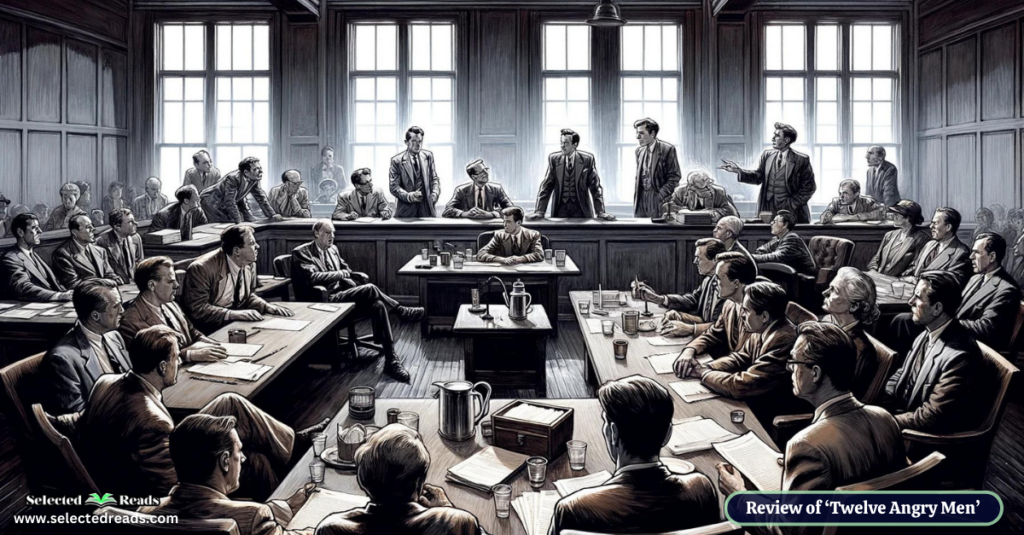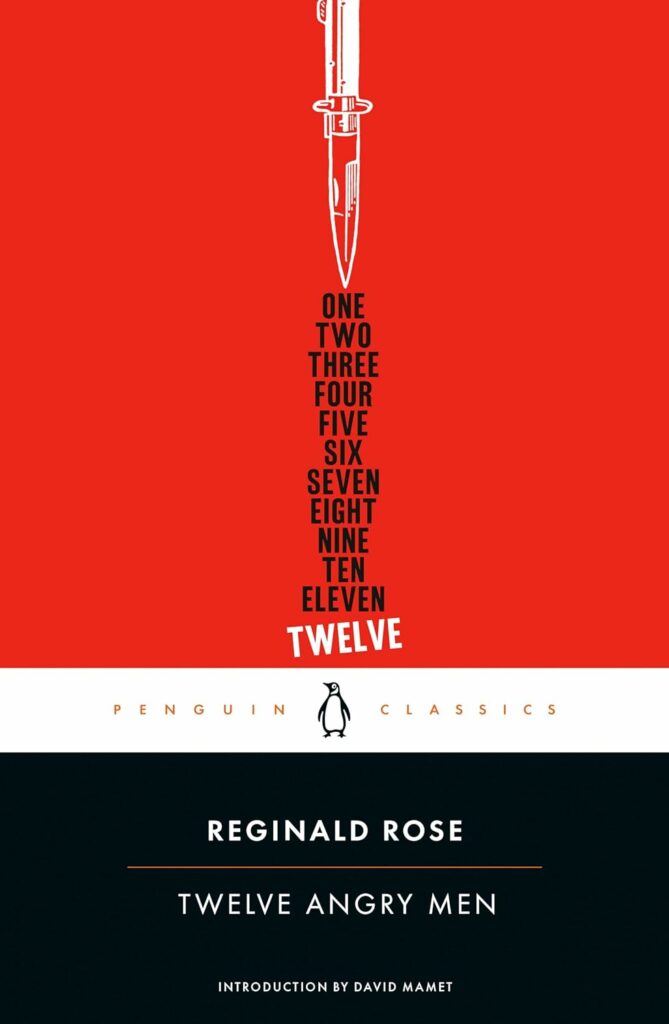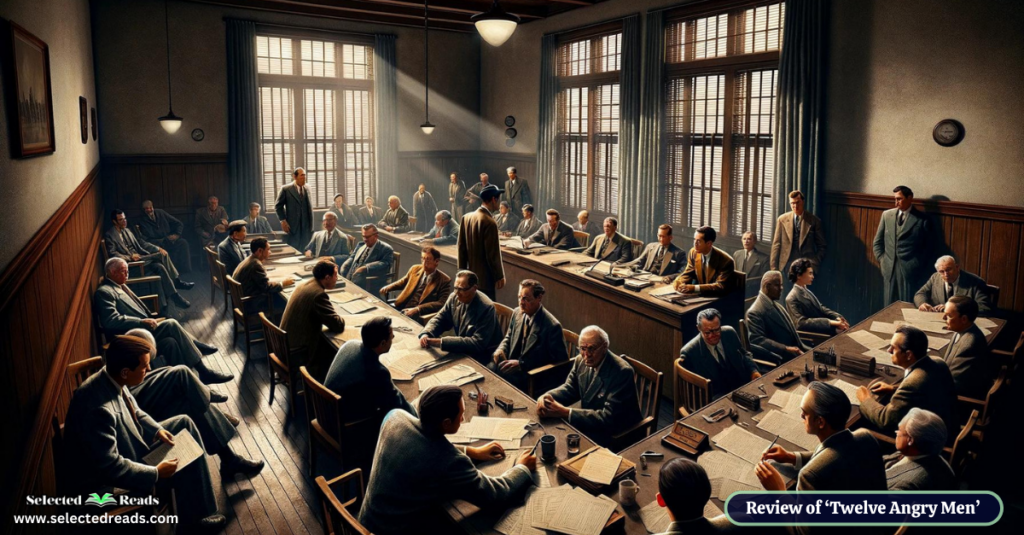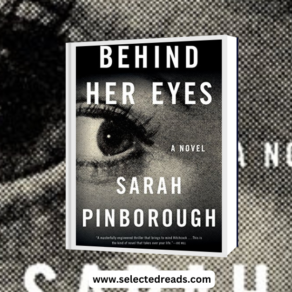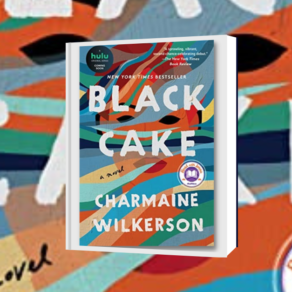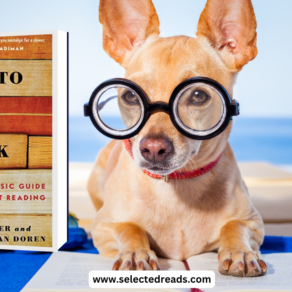In today’s spotlight is “Twelve Angry Men” by Reginald Rose, a seminal piece in the realm of drama that casts a penetrating light on the American judicial system and the complexities of human nature. This narrative, grounded in the legal drama genre, aims to introduce readers to its intricate storyline and richly developed characters, all while preserving the suspense and pivotal moments for first-time readers.
My exploration is structured to first lay out a detailed account of the play’s plot, carefully threading through its narrative without unveiling its critical twists. Following that, I’ll delve into the distinctive array of characters whose diverse backgrounds and personal biases bring the story to life and fuel its dynamic discussions. To conclude, I’ll pose several engaging questions designed for book club discussions, which are sure to spark lively debate and deeper reflection on the themes presented in this compelling courtroom drama.
12 Angry Men Summary
“Twelve Angry Men” unfolds in the confined setting of a jury deliberation room after the closing arguments in a murder trial have been presented. The defendant, a young man, is accused of stabbing his father to death. If found guilty, the mandatory sentence is the death penalty. The jurors, identified only by numbers and bringing with them their diverse backgrounds, personalities, and beliefs, must unanimously decide his fate.
The story begins with a preliminary vote where all jurors, except for Juror Eight, vote guilty. Juror Eight’s dissenting vote is not a declaration of the defendant’s innocence but rather a plea for a deeper discussion about the case’s facts, highlighting the importance of reasonable doubt.
Photo: Amazon
As the jurors revisit the evidence and testimonies, the layers of the case and their personalities unravel. Juror Eight meticulously challenges the key pieces of evidence: the uniqueness of the murder weapon, a switchblade, which he proves is not as unique as presented; the testimony of an elderly downstairs neighbor who claimed to hear the murder happen and saw the defendant flee, questioned due to the time it would take him to reach his door; and the account of a woman across the street who witnessed the killing through a passing train, questioned due to her eyesight and the visibility through the train.
Throughout the deliberations, various jurors reveal their biases and personal reasons for their initial guilty vote. The setting intensifies personal conflicts, notably between Juror Eight, who stands firm in his quest for justice and thorough examination, and Juror Three, who is driven by a personal vendetta against rebellious youths, reflecting his strained relationship with his own son.
Juror Eight’s persistence leads to discussions that reveal the flaws and prejudices in the jury system, yet also its strengths when individuals stand for justice and integrity. Slowly, one by one, the jurors change their votes to not guilty, each swayed by the arguments presented and their introspections.
The climax is reached with Juror Three, the last holdout, who is forced to confront his personal biases. His emotional breakdown, tearing up a photo of him and his son, symbolizes his realization of his unfair projection of personal issues onto the defendant. He finally changes his vote to not guilty, leading to a unanimous verdict.
In the end, “Twelve Angry Men” is a compelling examination of the jury system, democracy, and the concept of justice. It demonstrates the critical importance of reasonable doubt and the impact of personal prejudices on the pursuit of justice. The story concludes with the jurors leaving the courtroom, their task completed, and the defendant’s fate decided by their ability to confront personal biases and adhere to the principles of justice.
12 Angry Men Characters
Here is a quick overview of the characters in “Twelve Angry Men”:
- Juror One (The Foreman): Acts as the group’s moderator, trying to keep the discussions organized and civil. He is not particularly forceful but is respected for his role.
- Juror Two: A timid bank clerk, he is hesitant and easily swayed by others’ opinions. He represents those who struggle to find their voice in dominant settings.
- Juror Three: A small business owner, highly opinionated and stubborn, with a personal grudge that biases his view towards a guilty verdict. His conflict with Juror Eight is central to the drama.
- Juror Four: A stockbroker, he is rational, composed, and bases his decisions on facts rather than emotions. He demands evidence and is meticulous in the discussion of the case details.
- Juror Five: Grew up in a poor urban area, which gives him insight into the defendant’s life. He is sensitive about accusations related to slum backgrounds.
- Juror Six: A house painter, honest and straightforward. He is not a quick thinker but is determined to do what is right, even if it takes him longer to get there.
- Juror Seven: A salesman with a brash personality, he is more concerned with wrapping up the deliberation quickly than with delving into the intricacies of the case. His impatience reflects a lack of concern for the gravity of the situation.
- Juror Eight: The protagonist who initially votes “not guilty,” sparking the main conflict. He is thoughtful, calm, and seeks justice, urging others to discuss the evidence in depth. He challenges prejudices and looks for the truth.
- Juror Nine: The oldest juror, he is observant and wise, offering insights that others overlook. He is the first to support Juror Eight’s call for thoughtful deliberation.
- Juror Ten: A garage owner, he is bitter and prejudiced, often making bigoted statements. His biases cloud his judgment, making it difficult for him to see the case objectively.
- Juror Eleven: An immigrant watchmaker, he brings a fresh perspective to the discussions. He is respectful of the democratic process and passionate about justice, valuing the opportunity to participate in such a system.
- Juror Twelve: An advertising executive, he is slick and superficial, more focused on the process than the content. He flip-flops in his decisions, reflecting the indecisiveness of those easily swayed by the last speaker.
12 Angry Men Book Club Questions
Here are several questions that could spark insightful discussions among book club members:
- Character Influence: How do the jurors’ backgrounds and personalities shape their initial opinions on the verdict? Discuss the impact of personal biases on evidence interpretation.
- Justice Themes: Examine the play’s portrayal of the American legal system and the jury system as a means of delivering justice. How does “Twelve Angry Men” critique or support the effectiveness of the jury system?
- Moral Dilemmas: Consider Juror Eight’s solitary stance against a guilty verdict. What does this reveal about the courage required to uphold one’s convictions against group pressure?
- Reasonable Doubt Importance: How does the emphasis on reasonable doubt influence the jury’s decision-making process? Discuss its role and importance in ensuring a fair trial.
- Vote Changes: Choose a juror who changed their vote and analyze the critical moment or argument that led to this change. What does this reveal about the character and the play’s themes?
- Prejudice and Bias: Identify instances where jurors’ judgments are clouded by personal biases. How are these biases addressed or ignored throughout the play?
- Conflict’s Role: Explore how conflict among jurors is used to develop themes and characters. Is conflict more beneficial or harmful in their deliberation?
- Setting’s Impact: Discuss the significance of the play’s setting within a jury room. How does this confined space enhance the story’s tension and character dynamics?
- Juror Eight’s Leadership: Analyze Juror Eight’s leadership style. How does he persuade others, and how does his approach differ from traditional leadership models?
Final thoughts
To wrap up, it’s my hope that this brief exploration has piqued your interest in “Twelve Angry Men.” This pivotal work is more than just a story; it’s a profound reflection on justice, bias, and the human condition. For those who haven’t yet delved into its pages, I wholeheartedly suggest you give it a read. “Twelve Angry Men” promises not only a gripping narrative but also a lens through which we can examine our own beliefs and biases.



